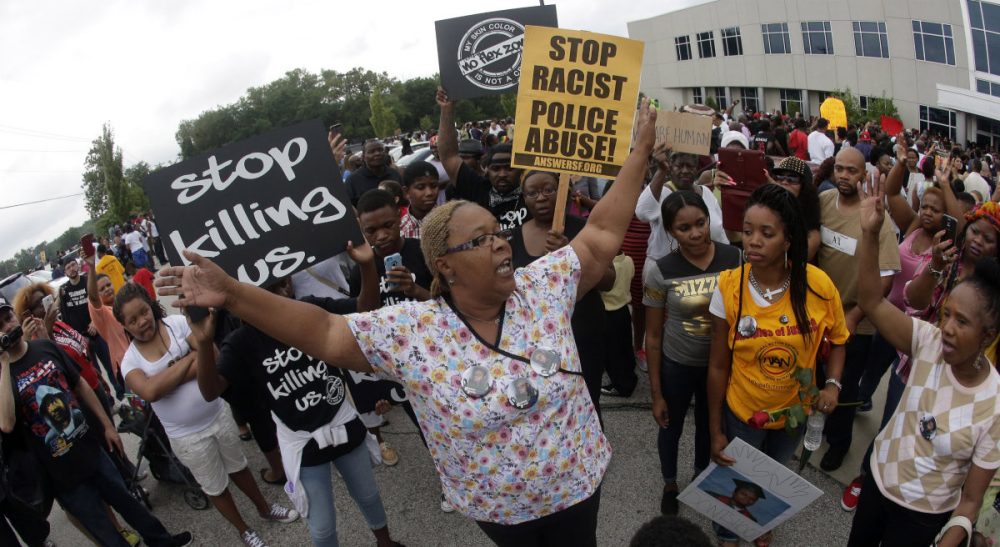Advertisement
Why Racial Bias And Militarization Are Eroding Trust In The Police

The police shooting of Michael Brown, an unarmed black teenager, in Ferguson, Missouri, has sparked both street riots and a much-needed nationwide conversation about police militarization, excessive force and race.
Fear — and justifiable anger — is palpable here in Boston and other Massachusetts cities and towns, where the police routinely stop and harass too many young black and brown people, simply because of their race.
You could hear that fear and anger as hundreds of people gathered last Thursday night on the Boston Common to raise their voices in solidarity with victims of police brutality.
Fear -- and justifiable anger -- is palpable here in Boston and other Massachusetts cities and towns, where the police routinely stop and harass too many young black and brown people, simply because of their race.
They called out the names — dozens of names — of loved ones who have been killed or injured in police encounters. Mark Fernandes McMullen… Malcolm Gracia… Burrell Ramsey-White… Denis Reynoso… David Woodman… Aiyana Jones… Eric Garner… Sean Bell… Oscar Grant… Marlene Pinnock… Wakeelah Cocroft.
People shared local stories of brutal police encounters: the young man beaten by police with a flashlight; the young man pulled from his car whose jaw was broken by police; two teenage girls forced by a cop to undress; a young man injured by police using a chokehold; a woman whose arm was fractured by police after she called them for help.
Hearing these heartbreaking stories of people targeted by the police — a.k.a. "getting posted" — in Boston and nearby cities, it is not difficult to imagine public riots breaking out here as they have in Ferguson.
Ask yourself or most any parent: If your children were being targeted and harassed by the police, would you have faith in the police? If your innocent son or daughter was killed at the hands of the police, would you be satisfied with a peaceful prayer vigil?
Add to this recent reports that Boston lags the nation in solving murders — particularly in historically black neighborhoods — and you have to ask yourself: If you were a person of color in Boston, would you trust the police to protect and serve your family?
Advertisement
Exacerbating this crisis is the growing militarization of American policing. Throughout Massachusetts and the nation, police are building wartime arsenals with some of the same equipment used in America’s wars abroad. Armed with grenade launchers, tanks, surveillance equipment and newly learned counterinsurgency tactics, local police departments are deploying new armaments primarily against poor people and people of color.
According to a recent ACLU report, there are now more than 50,000 paramilitary raids in America each year — about 124 homes every day. Only 7 percent of the time do true emergencies, like hostage situations, prompt these raids. More than 80 percent of the time, paramilitary tactics are used to search peoples’ homes for drugs, and disproportionately target communities of color.
The combination of racial bias and excessive militarization in policing clearly undermines public safety. Police who stop or search people based on race rather than evidence of criminal activity are not keeping us safe. Arming police as if they were waging a war against their fellow Americans does not keep us free.
It’s time for all of us -- and especially white Americans -- to admit that the problems in Ferguson also exist in Boston, Worcester, Springfield and virtually every city and town in our Commonwealth.
"As a black person in America, it's getting exhausting to still have to explain, in the year 2014, your right to exist in this country," writes blogger Kara Brown. "To explain that you are a human being whose value sits no lower than anyone else's. To explain our basic humanity. And perhaps worst of all, to explain exactly why we are outraged. We shouldn't have to explain why it's not acceptable for unarmed teenagers to be gunned down by the police."
It’s time for all of us — and especially white Americans — to admit that the problems in Ferguson also exist in Boston, Worcester, Springfield and virtually every city and town in our commonwealth.
Prayer vigils are important for healing. But we also need action. Every Massachusetts police department — starting with the State Police and the Boston Police Department — should adopt clear policies, training and systems of accountability to guard against racial bias in policing. We need to require that police wear body cameras, to protect both the police and the people they engage in encounters on the street and on the road. Finally, we need to just say "no" to turning America’s mighty military against our own people.
The tragic shooting death of Michael Brown started with a police stop. It’s up to us to decide where it will end.
This piece was co-authored by Carl Williams. Williams is a staff attorney with the ACLU of Massachusetts and worked previously for the Committee for Public Counsel Services' Roxbury Defenders Unit.
Related: